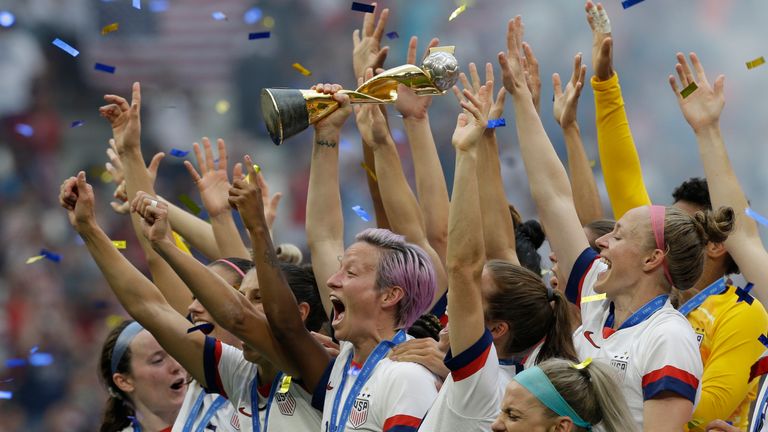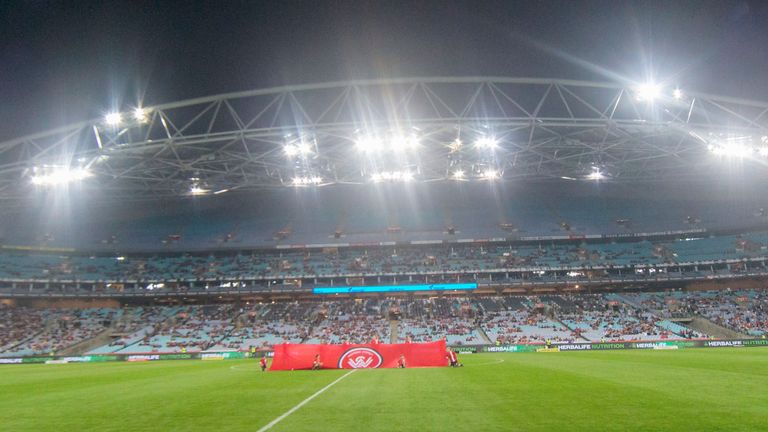England have been drawn in Group D with Denmark and China for the 2023 Women’s World Cup in Australia and New Zealand.
The winner of the Group B play-off – Senegal, Haiti or Chile – will complete England’s group.
World Cup debutants Republic of Ireland will face hosts Australia, Nigeria and Olympic champions Canada in Group B.
Sarina Wiegman’s European champions face an arduous schedule of travel at next summer’s tournament after being selected in Group D at Saturday’s ceremony in Auckland.
The Lionesses kick off their campaign in Brisbane before taking a 500+ mile trip to Sydney followed by a 900+ mile journey to Adelaide.
There will be a repeat of the 2019 World Cup final after reigning champions USA were drawn in Group E with the Netherlands. They will be joined by debutants Vietnam and the winner of the Group C play-off.
The USA, who were beaten 2-1 by the Lionesses earlier in October in a friendly at Wembley, are targeting an unprecedented third consecutive World Cup win.
The 2023 World Cup is the first to include 32 teams, increasing from 24 at the last tournament in France in 2019, with an inter-continental play-off tournament in February to decide the remaining three entrants.
The 32 nations have been drawn into eight groups of four. The top two in each group will progress to the knockout stages.
2023 World Cup draw in full:
- Group A: New Zealand, Norway, Philippines, Switzerland.
- Group B: Australia, Republic of Ireland, Nigeria, Canada.
- Group C: Spain, Costa Rica, Zambia, Japan.
- Group D: England, Group B play-off winner, Denmark, China.
- Group E: USA, Vietnam, Netherlands, Group A play-off winner.
- Group F: France, Jamaica, Brazil, Group C play-off winner.
- Group G: Sweden, South Africa, Italy, Argentina.
- Group H: Germany, Morocco, Colombia, South Korea.
England and the Republic of Ireland are two of 29 teams to have qualified for the tournament so far:
- Australia (co-hosts)
- New Zealand (co-hosts)
- China (AFC)
- Japan (AFC)
- Philippines (AFC)
- South Korea (AFC)
- Vietnam (AFC)
- Morocco (CAF)
- Nigeria (CAF)
- South Africa (CAF)
- Zambia (CAF)
- Canada (CONCACAF)
- Costa Rica (CONCACAF)
- Jamaica (CONCACAF)
- United States (CONCACAF)
- Argentina (CONMEBOL)
- Brazil (CONMEBOL)
- Colombia (CONMEBOL)
- Denmark (UEFA)
- England (UEFA)
- France (UEFA)
- Germany (UEFA)
- Italy (UEFA)
- Netherlands (UEFA)
- Norway (UEFA)
- Republic of Ireland (UEFA)
- Spain (UEFA)
- Sweden (UEFA)
- Switzerland (UEFA)
Ten teams will compete for the final three places at the inter-confederation play-off tournament in February, which will be held in New Zealand:
- Chinese Taipei (AFC)
- Thailand (AFC)
- Cameroon (CAF)
- Senegal (CAF)
- Haiti (CONCACAF)
- Panama (CONCACAF)
- Paraguay (CONMEBOL)
- Chile (CONMEBOL)
- Papua New Guinea (OFC)
- Portugal (UEFA)
What is the World Cup schedule?
The group stage will begin on July 20 and run over a two-week period finishing on August 3 and see group winners and runners-up progress to the round of 16, which takes place from August 5 to August 8.
The quarter-finals, which will be held in Wellington, Auckland, Brisbane and Sydney, are scheduled for August 11 and 12.
The first semi-final will then be played on August 15 in Auckland, with the other semi-final taking place on August 16 at the Accor Stadium in Sydney, which will then host the final on August 20.
A third-place play-off will be played the day before the final on August 19 in Brisbane.
What are the venues?
There are nine host cities, five in Australia and four in New Zealand:
Australia
- Sydney – Accor Stadium and Allianz Stadium
- Brisbane – Suncorp Stadium
- Melbourne – AAMI Park
- Perth – HBF Park
- Adelaide – Hindmarsh Stadium
New Zealand
- Auckland – Eden Park
- Wellington – Sky Stadium
- Dunedin – Forsyth Barr Stadium
- Hamilton – Waikato Stadium


